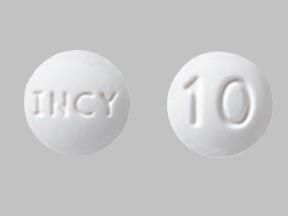Jakafi and Alcohol/Food Interactions
There are 2 alcohol/food/lifestyle interactions with Jakafi (ruxolitinib).
Ruxolitinib Food/Lifestyle
Moderate Food Interaction
Do not consume grapefruit or grapefruit juice during treatment with ruxolitinib unless directed otherwise by your doctor. Grapefruit juice can increase the blood levels of ruxolitinib. This may increase the risk of side effects that affect your bone marrow function, resulting in low numbers of different types of blood cells. You may be more likely to develop anemia, bleeding problems, or infections. Contact your doctor if you experience potential signs and symptoms of these conditions such as paleness, fatigue, dizziness, fainting, unusual bleeding or bruising, fever, chills, sore throat, body aches, or other flu-like symptoms. It is important to tell your doctor about all other medications you use, including vitamins and herbs. Do not stop using any medications without first talking to your doctor.
Switch to professional interaction data
Ruxolitinib High Cholesterol (Hyperlipoproteinemia, Hypertriglyceridemia, Sitosterolemia)
Moderate Potential Hazard, Moderate plausibility
ruxolitinib - lipid elevations
The use of ruxolitinib may increase total cholesterol, low-density lipoprotein (LDL) cholesterol, and triglycerides. It is recommended to assess lipid parameters approximately 8-12 weeks following initiation of therapy and to monitor and treat per clinical guidelines for the management of hyperlipidemia. Care should be exercised when using this agent in patients with lipids disorders.
Switch to professional interaction data
Jakafi drug interactions
There are 517 drug interactions with Jakafi (ruxolitinib).
Jakafi disease interactions
There are 12 disease interactions with Jakafi (ruxolitinib) which include:
- cardiovascular risk
- malignancy
- thrombosis
- lung toxicity
- cytopenia
- hepatic impairment
- Hepatitis B
- infections
- lipid elevations
- PML
- renal impairment
- tuberculosis
More about Jakafi (ruxolitinib)
- Jakafi consumer information
- Check interactions
- Compare alternatives
- Pricing & coupons
- Reviews (33)
- Drug images
- Side effects
- Dosage information
- During pregnancy
- FDA approval history
- Drug class: multikinase inhibitors
- Breastfeeding
- En español
Related treatment guides
Drug Interaction Classification
| Highly clinically significant. Avoid combinations; the risk of the interaction outweighs the benefit. | |
| Moderately clinically significant. Usually avoid combinations; use it only under special circumstances. | |
| Minimally clinically significant. Minimize risk; assess risk and consider an alternative drug, take steps to circumvent the interaction risk and/or institute a monitoring plan. | |
| No interaction information available. |
See also:
Further information
Always consult your healthcare provider to ensure the information displayed on this page applies to your personal circumstances.


